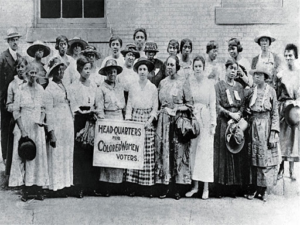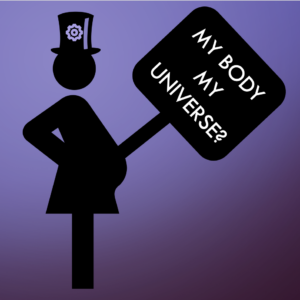If we assume there is a Multiverse, everything we’ve been taught about morality changes. In our last episode, we opened up the topic of abortion. Yes. We went there! What does it mean to abort someone if there is a Multiverse? And did I say “someone”? What is a person? Are they cell tissue? Does a fetus have a soul? What is a soul? What happens to it if it is terminated? Pretty basic questions. Right? And now, as if I wasn’t delving into divisive territory enough, we’re going to start talking about women’s rights. Ready?

Before getting started on women’s rights, let’s review a few things. We can start with the Multiverse. If you don’t believe in the Multiverse, you shouldn’t be listening to this episode. You need to start from episode one and move forward one episode at a time because I’ve offered proof and won’t be doing that over and over again. Instead, at least for Season 1, in each episode I pick up where I left off on the last. And that has us jumping not just to the Multiverse at this point, but to the good news of Maximized Awesomeness.
As an alternate path to understanding this, you can also take our free Pamalogy 101 course. You’ll earn yourself a top hat if you pass. How’s that?! And while I’m doing commercial plugs, let me encourage you, if you are either wealthy and would like to fund a better platform for working out differences that will promote civil discourse and methodically present opposing perspectives, and actually re-unite this very divided world, or if you would like to participate as a beta tester who loves research, then please contact us about the CounterChecker. Picture Wikipedia, only people with polar opposite viewpoints get to keep each other accountable, so that the encyclopedia is not only vast, but fair, civil, and not one-sided. We need to raise $1.4 million to get this project started. Once we have funds, it will take about nine months to develop the platform. The CounterChecker would be the ideal venue for dealing with every question related to women’s rights, and for that matter, every other topic conceivable. Is truth and civility important to you? It sure is to me. And if you’re not wealthy, consider supporting the Pamalogy Society Podcast through Patreon. If you did, then I could devote myself to it full time, instead of driving for a living.
Did you know what I do to pay my bills? I’ve given over 25,000 Uber rides. I’ve also given over 5,000 Lyft rides and done deliveries too. Between other jobs, I’ve been driving for a living since 1978. I really like Uber. I haven’t been shot at driving for Uber or Lyft the way I did when I worked for Yellow Cab. Oh yeah. Six shots fired. They blew out the tires and windows hoping to get some drug money but they missed me every time. Uber is much safer for drivers. And thanks to Uber, I earned a scholarship and got another degree. I already had a bachelors degree in Music Composition from the University of South Carolina from way back in 1980, but my kind of music wasn’t in high demand. We’ll talk about that some other time. I also got a masters degree, working on it slowly over the next twelve years in theology, first at a Catholic Seminary from 1982 to 1986 and then I finally completed my masters at a tiny Orthodox Christian Seminary in 1995. I’ll be a lifetime student, I suppose. Uber helped me pay for a bachelors degree in Interdisciplinary Studies at Arizona State University. IDS degrees are for those who want double majors. I wanted a degree in philosophy, so I could pave a path toward a PhD later on, but philosophy doesn’t pay the bills, so I’ll also have a concentration in Organizational Leadership. For starters, this all preps me to lead the Pamalogy Society.
We’re still on our commercial break so while I’m talking about driving for a living, let me announce another program that the Pamalogy Society will support – a driver owned rideshare co-op. Think about how philosophy, organizational leadership, and driving careers might be connected here. You’ll hear much more about this in upcoming episodes. At the heart of it is the fact that driving for a living isn’t very lucrative. It’s not just rising fuel costs. Two factors keeping drivers from earning top dollar are shareholders taking profits and corporate executives and staffs overpaying themselves. There are 1.6 million gig drivers in the United States alone, doing 6% of all driving. My goal, in the coming days, is going to be to unite drivers across the country to raise money for a new rideshare company that is owned by drivers through the miles they drive, by the passengers, according to the money they’ve paid for rides, and by the customers who receive goods. The idea will be to raise sufficient capital through member dues, held in escrow until a threshold is reached. Doing this successfully involves one simple thing – going viral. Share this blogcast and you’ll be helping.
Okay, end of commercials – back to Maximized Awesomeness and women’s rights. I should start by addressing your expectations. If you were hoping to get an endorsement from pamalogy for your political agenda, then you are here for the wrong reason. Our foremost focus for right now is on fundamental ideas. Applications of those ideas is Applied Pamalogy. We need to talk about the principles of justice first, figuring out where the right balance should be in the light of what pamalogy is all about – maximizing awesomeness. We’ll cover women’s rights as we go. Be patient.

Maximized Awesomeness has two basic senses. In the highest sense, it’s God. Pamalogy tends to avoid using the word “God” because we don’t want the Pamalogy Society to be confused with a church or a religion. We are a philosophical society. Pamalogy is the philosophy of awesomeness. But Awesomeology, like most philosophy, does include the discussion of God. And specifically here, we define God as Maximized Awesomeness. There are lots of religions and traditions and attitudes and beliefs and there are lots of things people think of when they hear the word, “God.” Here, when we use this word, we are offering a very precise definition. Maximized Awesomeness is that than which there could be nothing better, nothing greater, nothing more awesome. This idea entails a few important things. First, it means there has to be a Multiverse. Two Universes mean two great histories can happen. Think about that. Is there a career you would have liked to have pursued? A dream? Was there more than one love in your youth? How would it have turned out if you had married that other person? How many possible great histories could there be? Do you have a fear of missing out? If the Multiverse is true, then it’s also true that you won’t miss out on anything at all.
Think about that. You are going to experience every possible good and great story of your life conceivable, thanks to the Multiverse and thanks to Maximized Awesomeness. I told you it was good news. If you don’t believe it, start with the first episode. Take Pamalogy 101. The blogcast is a supplement to Pamalogy 101.
And it gets better and perhaps still harder to believe, but also true because Maximized Awesomeness also entails the absence of evil. We’ve covered this repeatedly because it’s basic to every discussion. Evil does not exist.
It doesn’t exist not because there is no such thing as right and wrong. It doesn’t exist because if it did exist, then Maximized Awesomeness would be untrue. Either Maximized Awesomeness is true or untrue. It isn’t both true and untrue. I’ve proven that it is true and I’ve shown why evil seems to exist. It seems to exist because there are many types of good things that could happen in the context of evil, or in relationship to evil things. It would be impossible for every possible good thing to be true if those types of good things that involve relationships with bad things did not exist.
It’s not an easy concept to accept because it requires that we understand the Universe to be a grand illusion of some sort, where all the good things that happen are true, but all of the bad things that happen are imaginary.
And yes. That is precisely the assumption we have to make if Maximized Awesomeness is true. Maximized Awesomeness could not be true otherwise.
So what does all this have to do with women’s rights?
Well as I was saying, maximized awesomeness has more than one sense. The other sense of it is how to maximize our own awesomeness and the awesomeness of the world we live in. We want to ask what an ideal world would look like; and that, my friend, would be a world in which women’s rights were fully respected, where they flourished and where women reached their fullest potential.

So, in the last episode I was telling you about what happens to the soul of an aborted fetus if it is true that there is a Multiverse and if Maximized Awesomeness is true, which it is. Let’s review that. I stated some very obvious things. Obviously, if a person is not granted life, this affects the Universe and the world that we live in, not just the fetus. It deprives this Universe of that person’s life. But there is more to this Universe than first meets the eye if there is a Multiverse. If every possible good thing happens, then each moment comes packed with all sorts of potential futures. Each moment is not just a moment in “this” Universe, but one in countless possible futures corresponding to “other” Universes. Time unbundles bundles of Universes. It unpacks us. It unpacks men, women, non-binary, confused, fully grown, and fetus. That means you. Time unpacks your futures. You suppose you only experience one of those futures, but a deeper “you,” the person “you” and “spirit of you” experiences all you ultimately can and should be in all awesomeness. And much of this unravelling, this unpacking of you, happens in relation to evil. It happens in contexts where all sorts of evil thing appear to be real. All of this is entailed in the one concept of Maximized Awesomeness if it is true. And it is true.
As for the fetus, if their personal awesomeness is maximized, and there is nothing good in their conscious experience of being aborted in any Universe, then an abortion in this Universe cannot affect them, because their awesomeness is in many other Universes instead. Still, there is the relationship they might have had with this Universe had they lived. If it is true that the Universe would be affected by their absence, it is also true that the fetus is affected by its lack of presence. The fetus may make up for it in other Universes but there is no escaping the fact that by terminating the pregnancy, the fetus’s life in relation to all future Universes that could stem from the moment of their death forward is affected in a relationship of termination.
Is that a bad thing? Is the termination of a potential future, or an uncountable number of them, necessarily a bad thing? Despite my Catholic and Orthodox background, I’m going to answer this question, “no.” And here’s my reason. We terminate countless potential futures every time we make any decision, not just the decision to terminate a pregnancy. We make decisions all day long every day, and many decisions may be determined by forces beyond our control, all terminating countless alternative futures.Whether it’s us, or the forces beyond our control, termination of potential futures is simply a law of the Multiverse. Every decision we make affects the future.
Here’s the bottom line: an abortion affects the Universes that will unfold after the pregnancy is terminated. They will all be deprived of the life of that person and their potential progeny, but it does not affect the potential of the fetus. That fetus is always enjoying the maximization of its awesomeness thanks to Maximized Awesomeness, no matter what decision its mother may have made in this Universe, only that enjoyment will not be experienced here. It will be experienced in a large set of other Universes instead.
Women’s rights are largely tied in with the right to an abortion. The classic argument always pits the rights of the mother against the rights of the fetus. It pits the value of the freedom to choose against the value of life itself. In a single Universe perspective, the question of fetal rights is very different. The fetus would have no other opportunity to live. The value of life itself is seen very differently. It is valid to see the value of life as a matter of what potential it has, but that potential is only measured by its potential in a single visible Universe. If it is taken away, its potential is removed.
Despite a lot of opposition, and no lack of attempts at fair reasoning, the argument for the value of life as measured by potential is still valid and sound. Let me take a step back to make sure you know what I’m talking about. Some people think the value of life is found in ability. If something is mature enough to live on its own, then maybe it qualifies as human and worth protecting and considering a moral agent. Some people think life’s value is found in its intelligence. If it isn’t self-aware, then it isn’t a person so there’s nothing wrong about killing it. Still other people think about how lovable a thing is. If it’s cute, if it’s relatable, then we consider it like us, maybe better than us, because of its innocence and attraction.
These values all come from the way we relate to children. We aren’t designed to adore fetuses the same way we love our children. The womb takes care of the protection of a fetus. Relatability is what takes care of babies and cute animals and the pets we seek to protect. That’s what makes them survive. That sense of relatability gives us a sense of responsibility towards them as fellow human beings. None of this needs to be built into us for the survival of our species when it comes to fetuses. So we often assume that because we don’t feel like we can relate to a “mass of cells” as a fellow human being, which we might see as a parasite, we don’t consider it to be a human being we need to protect. The upshot of this is that the argument for the value of life in terms of life’s potential is dismissed as something heady, something some man in some ivory tower in an ivy league Catholic school must have come up with hundreds of years ago. It’s time to be real and get that man to mind his own private business.

But in reality, the argument from potential for what constitutes the value of life is very strong. We don’t say about a person under anesthesia that since they are unconscious that we should have a right to terminate them. This is because we recognize that their potential to enjoy life is why we should protect their right to have it. If at any time anyone wanted to kill anybody else, if it was true that the value of life was not in its potential, all we would have to do is anesthetize them and then kill them as they slept. It would be painless. They would have no ability. They would be entirely dependent on others for life – every argument used to justify the idea that a fetus is not a person. We hear they feel no pain. We hear they are not self-aware. We hear they are dependent on others for life. Right? Technically, outside of relatability that might stem from memories of a person, all a person under anesthesia is is a clump of cells, not necessarily cute ones. The argument from potential means they are a moral agent. To take their life is to rob them of their future as human beings.
There are fair counter arguments to this. An adult can survive outside of the womb, whereas a fetus can’t. Bugs, worms and viruses are not our bodies, though they may live inside us. We must kill these at times in order to survive. We don’t relate to bugs and viruses. A consistent ethic of life wold consider the rights of viruses. Pamalogy does consider the rights of viruses. Consistent ethical analysis demands this. Consistency also demands that we look at a newborn baby and realize that it can’t survive outside the womb by itself either. But baby rights and bugs rights are a discussion for another day.
The point I want to make sure we’ve covered foremost among women’s right issues, is that the argument for the value of life in terms of potential shifts dramatically if Maximized Awesomeness is true. Maximized Awesomeness, belief in God if you will, puts the anti-abortionist’s argument from potential on a sort of half stop. It dismantles the argument in terms of eliminating the potential of the fetus itself as itself. Potential still does matter for the Universes being unbundled from the termination point forward. This is the distinction I want to highlight. Forget the fetus for a moment. Anything that anyone does that is right or wrong, affects the future of all the Universes that will ever be unraveled from the point of that moral decision forward. If it is a bad thing, it affects them negatively. If it is a good thing, it affects them positively.
For a moment, let’s forget about what things are right or wrong and ask who or what is being wronged or righted. What is being wronged or righted in any decision of any type is the potential of all the Universes affected by that decision. Terminating a fetus does not remove their potential. It removes their potential in this Universe and its associated bundles of futures. If Maximized Awesomeness is true, then death itself has no sting. The right to life is something we couldn’t remove if we wanted to because death is impossible. What we remove, if we terminate a pregnancy, is the potential that life might have had in a particular set of Universes.
But wait a minute. Didn’t I also say that all evil things are illusions?
Yes, I did. Death itself is impossible. All bad things are impossible. They appear to exist in this Universe and we think we do bad things ourselves in the exercise of our free will. So, how do these seemingly contradictory claims fit together?
These contradictions are reconciled by the understanding that what we think we see and know is a partial illusion. Each of the unfolding Universes we see as possible futures is a partial illusion. The non-illusory part is us. It’s we the perceiver, the thinking being. The rest is opportunity. We have to first believe that there is such a thing as a future if we are to seek to maximize its potential for awesomeness. We could easily step back and suppose we were not responsible in any way for the future of any Universes, standing instead on the rock of Maximized Awesomeness, knowing that all the bad stuff we would normally hope to prevent, was going to be an illusion anyway. So why bother?
It’s a great question but also a very ironic one. Most people struggle to believe that Maximized Awesomeness, (and the Multiverse that Maximized Awesomeness entails), exists in the first place. Even the most devout pamalogist will treat the Universe as if it were entirely real, realizing that it’s not at the same time. The reason these seemingly conflicting viewpoints are not really in conflict is that hypotheticals are the basis for good opportunity. Let me say that again. Hypotheticals are the basis for good opportunity. An example will help explain.
If I forgive you because you’ve wronged me, maybe it’s entirely true that you haven’t actually wronged me. because your wronging me was an illusion uploaded to my mind, but if I didn’t seize the opportunity to forgive you in that moment, then my act of forgiveness would lack an opportunity to be part of reality. That would mean that some good thing was lacking. Fortunately, if I fail to seize that opportunity, knowing Maximized Awesomeness is true, I can rest assured that I’ve seized that opportunity in other Universes, but either way, the response to a hypothetical construct is involved. So … hypotheticals are the basis for good opportunity. Understood?
Bottom line, the pamalogist doesn’t seek to escape perception even if there is some basis for supposing that reality and perception are two very different things. They aren’t escaping reality. They aren’t escaping perception. They are delivered from perception by reality. And in the process they become agents for moral good as part of a Multiversal reality.

This is all a lot of preamble for the discussion of women’s rights, but it’s necessary for anyone who really wants to understand pamalogy. All lives matter. Principles of justice, fairness, and deliverance from oppression apply to women and fetuses alike and they may apply to parasites and microbes too, believe it or not. Yes, we will talk about bugs rights in later episodes. If you can’t explain why bugs lives don’t matter, then you have no consistent ethic of life. A truly open mind would not avoid such a conversation, but that’s for another time. What I want to make clear here is that when we sin, our sin is a hypothetical sin against many hypothetical possible futures. The argument from potential is valid and it’s sound. When a woman chooses to terminate a pregnancy, if she is concerned at all about the moral ramifications of her decision, she benefits by understanding the ramifications of that action, not just for her own circumstances, but for the benefit of that fetus she carries.
Those circumstances are complex and varied. If her own future and career are deeply affected, lots of hypothetical futures are involved. Anti-abortion advocates often say that by taking a life away, a lifetime of choices are removed. Her right to one choice, however limiting it may be towards her own potential future, would limit a small number of choices in comparison to the complete removal of all potential choices the fetus inside her would be subject to based on her decision. But numbers of choices is just one measure of justice among many.
My goal in today’s blogcast is simply to point to who and what is affected by the choice and to what isn’t being affected by that choice. What is affected is a hypothetical set of future Universes. Our goal and our responsibility is to seek to maximize the awesomeness of the present and the future in any decisions we make. This is a simple and very broad moral imperative that is hard to disagree with and about as much as we can cover in a single episode.
Spelling it out will be the hard part. For women, it means finding ways they can flourish and find fairness and freedom in a world that’s been dominated by men. The world still is dominated by men in many ways. One book by a feminist writer I really liked was written a few decades ago by Bell Hooks, Feminist Theory. Hooks pointed out very painfully that the argument for equal pay for equal work is important but it’s overshadowed the larger matter of women’s oppression on the other side of the tracks. The systemic oppression of black women caught in a poverty trap far outweighs the still very real oppression of women seeking equality in executive management positions, not hired because they are likely to have children before long, or paid less than males in the same companies and professions. The number of obstacles to success is unequal for marginalized black women and other minorities as a whole. Plus they’ve historically lacked a voice.
I haven’t touched on which political parties or policies better address these problems. My goal is to lead rather than follow. Political theories and theories of justice are closely tied together, and economic theories with them, so I’m going to carefully lay out the foundations in upcoming episodes. Justice, in every sense of the word, is vital to the maximization of awesomeness. Exploring how best to maximize our awesomeness and the awesomeness of the world we live in involves exploring these issues and leaving no stone unturned. We’ll eventually cover it all. For now, if the rights of a fetus are pitted against the rights of a mother, we see that feminist theory may lead in one direction, while a theory of choice might lead in another. If we consider only choice, then the amount of choice taken away through termination affects the fetus more than it affects the mother. If we weigh a theory of choice against a feminist theory, we might come up with a very different conclusion about what a mother’s best choice would be, whether it should be her choice at all, or whether it is the state she lives in or the Federal government, that should make that choice. There is an answer. I’m going to call for something I call a “balanced ecosystem of theories.” The maximization of awesomeness is a call to the cultivation of flourishing ecosystems. Ecosystems of justice are part of that. I’ll explain what this means in our next episode. Ciao!
URL for sharing this transcript page: https://pamalogy.com/2022/06/27/womens-rights/
URL for sharing this podcast: https://player.captivate.fm/episode/93204e63-f1ac-430c-9c0e-4b0e017d5c67
URL for sharing just the audio file: https://podcasts.captivate.fm/media/034ce0db-b5f7-42f7-bf42-53ed517beb50/Episode17-WomensRights-converted.mp3
Previous: Unpacking Bundled Souls
Up Next: Multiversal Metaetchics – Sex, Religion and Justice


